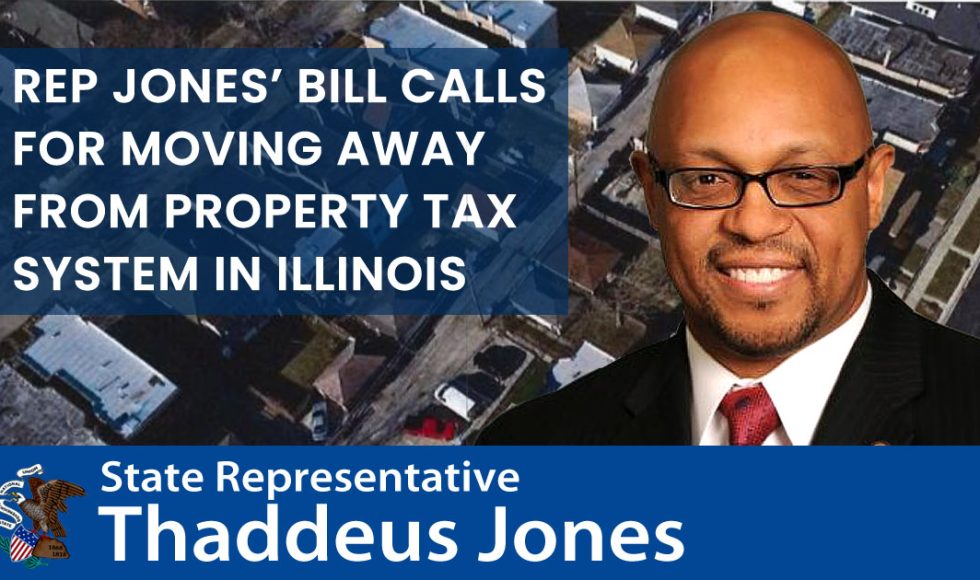Illinois, whose notoriously high property taxes are a constant source of grief for property owners, should look into abandoning the concept and relying on income taxes for revenue, according to a bill introduced in Springfield last week.
It’s an ambitious five year plan. Research should start forthwith to “determine the feasibility of eliminating, by no later than January 1, 2030, the property tax system in the state,” says HB3338, introduced Feb & by State Rep Thaddeus Jones, D-Calumet City.
With the nation’s second highest rate, behind only New Jersey, Illinois collects tens of billions of dollars from property taxes, nearly $34 billion in 2020.
‘The system needs a complete overhaul,” Jones told Crain’s in an email.
The Jones bill is more specific about the direction the state should go than a law passed by both houses of the General Assembly last year and signed by Gov. JB Pritzker in August. That measure requires the Department of Revenue to undertake a “comprehensive review” of the property tax system, but doesn’t mention shutting it all down.
The 2024 law is similar to a law Pritzker signed in 2019 creating a property tax relief task force. That report recommended reforming the assessment process, reorganizing school funding and other measures, but didn’t call for ending the state’s property tax system that dates to the early 1990s.
Fueling his effort to wean the state off of property taxes, Jones wrote, is the huge margin of success in the November vote on an advisory referendum that called for higher taxes on personal incomes over $1million to provide some property tax relief. Estimates were that the “millionaire’s tax” if enacted could generate $4.5 billion in revenue.
“I am comforted” by the 61% vote in favor of the referendum and other signs of support for revamping the the property tax system, including the law enacted in August,” Jones said.
Public support might be building behind the goal of undoing the property tax system, while in the past, Jones wrote, “my experience has been finger pointing by elected officials” that effected little change.
Walking away from a tax structure isn’t a daydream, Jones wrote in his emailed comments, but a potential path to a fairer mechanism for funding the state’s needs. Jones’ district is mostly in the south Cook County suburbs, and he is also the mayor of Calumet City.
In that part of the region, the property tax burden was already the heaviest in the Chicago area before the triennial assessments last delivered the biggest jump in assessed values in three decades.
The excessive burden on south suburban property owners is a long running problem. It’s largely the result of decades of decline in the commercial tax base, following the loss of the steel industry in the late 20th century.
“There is no reason that the south suburbs, which have lost manufacturing and are suffering a perfect tax storm should have to suffer in silence,” Jones wrote.
If passed, Jones’ bill would require the Department of Revenue to “propose spending cuts or an increased income tax rate to facilitate” the move away from property tax revenue. In his email to Crain’s, he sad the state should also look into consolidating taxing districts to save money. In a state that has more taxing districts than any other, a poll last fall found Illinoisans support consolidation by a margin of 2-to-1.
“There are taxing bodies that exist now where their function can be handled by another agency,” Jones wrote, and the tax money they’re collecting “will go back to the taxpayers.”
Relying more on taxing income would ostensibly shift the heaviest burden to the highest income earners and potentially result in some wealthy people leaving the state. A 2024 study of 110 years of tax policy published in the American Economic Journal noted that when income taxes go ip, people with high incomes often move to lower tax places.
As introduced, Jones’ bill calls for the Department of Revenue’s study to include researching “other states that do not allow for the imposition of taxes against real property.” All 50 states and Washington DC have property taxes although several have rates as little as one quarter of what Illinoisans pay.
Jones said the language in the bill was misphrased and will be clarified when the bill is called. “The goal is to examine the state of Illinois system,” he wrote, “not any other state’s system.”


